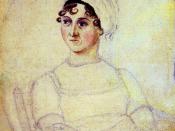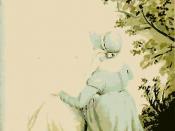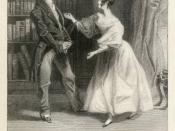The place of unmarried women in British society was determined by their social status and the size of their dowries. Married women had more freedom and influence than unmarried women, and their positions were defined by the rank and wealth of their husbands. Unmarried women could be respected and influential, only if they were of high birth and had a great deal of money. Women of the low gentry, who were unlucky enough to have small dowries (or no dowries at all), were relegated to borderline poverty and being recipients of charity.
The heroine, Elizabeth Bennet, is the second of five daughters. Her father is a member of the low gentry; he inherited an entailment of money, house, and land, but he is not wealthy. Mr. Bennet receives a limited income from a farm that he owns, but does not work himself. Since he has no son, (and only males can inherit entailments), all that he owns will be inherited by a distant male relative (Mr.
Collins). Mrs. Bennet has very little money, leaving Elizabeth and her four sisters with small dowries, and little chance of making good marriages. A young woman of poor means had a chance to marry only if she was striking in appearance and wit, and if she was lucky enough to attract a wealthy man who did not need to marry for money. Elizabeth Bennet was just such a young woman.
"Pride and Prejudice", written by Jane Austen, gives its readers a glimpse of the world of women of the gentry in eighteenth century England. Jane Austen wrote about what she knew. As a daughter of the low gentry--a cleric, Austen moved in circles much like those she described in her books. Austen had five brothers. Edward was adopted by wealthy, childless relatives, inherited...


